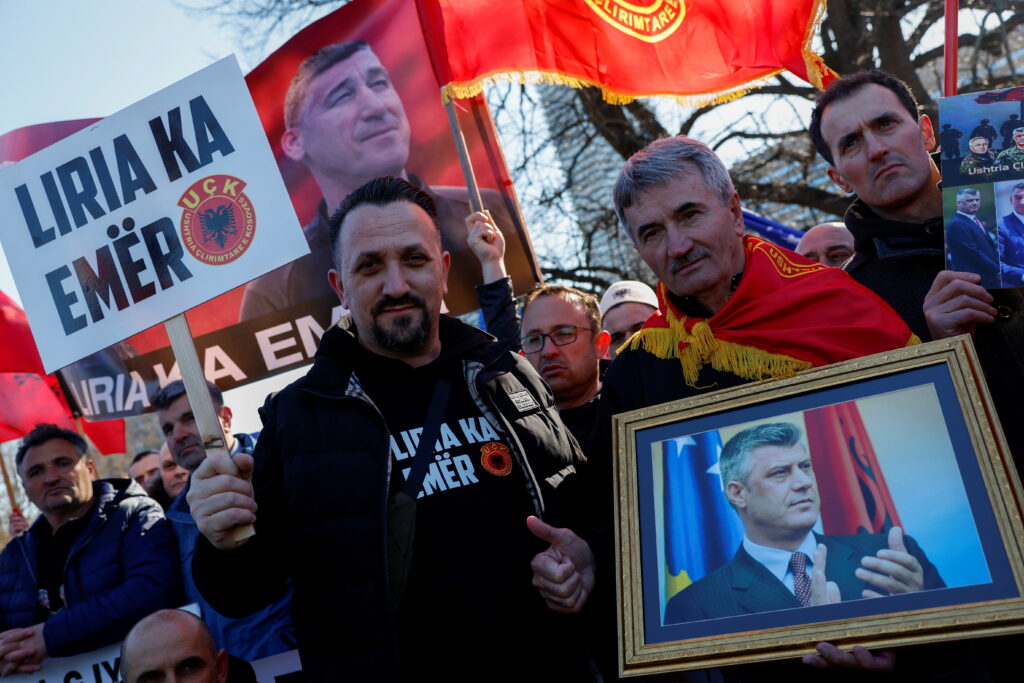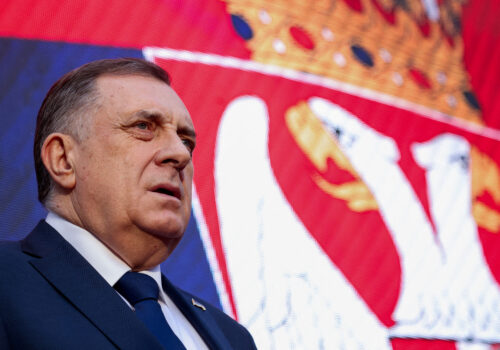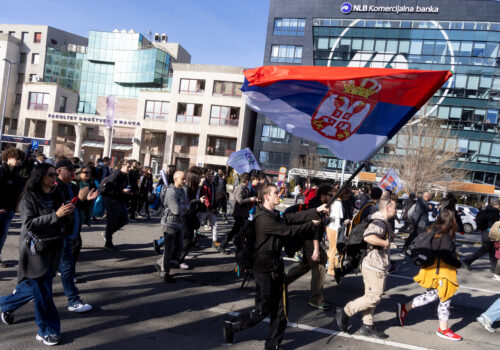
Did a political representative of a guerrilla army have command responsibility for alleged crimes committed by its members during the Kosovo war? This is the central question an international trial panel will soon have to answer in the case against Hashim Thaçi, Kosovo’s former wartime leader turned politician—as prime minister and later president.
Since November 2020, Thaçi has been in detention at the Kosovo Specialist Chambers, a hybrid Kosovar–international court in The Hague, alongside three other members of the Kosovo Liberation Army’s (KLA) General Staff. Their trial began in April 2023, and the prosecution took two years, concluding in April of this year.
The indictment against Thaçi and the three others alleges that during 1998-1999—while the KLA waged a rural insurgency against the Yugoslav army and police, whose top leadership was found guilty of massacres and the ethnic cleansing of at least 700,000 Albanians—the KLA engaged in a number of illegal detentions, disappearances, mistreatment, and murders of civilians seen as political rivals and collaborators, both Albanian and Serb. The prosecution brought 125 witnesses and 155 participating victims, and it argued that members of the KLA General Staff, including Thaçi as the then head of its political directorate, bear responsibility as part of a “joint criminal enterprise.”
On September 15, the defense opened its case, announcing just fifteen witnesses—mostly senior Western officials with direct knowledge of events. The strategy is not to deny the alleged crimes, which do not implicate Thaçi directly. Instead, the defense is arguing that the KLA lacked a proper command structure and that Thaçi, often outside Kosovo and serving in a political role, had no authority over operations.
A question of control
The first defense witness carried the weight of the US government of that era. James P. Rubin, former assistant secretary of state, testified for three days, accompanied by current State Department officials as observers. He rejected the prosecution’s portrayal of Thaçi’s power at the time and disputed the notion that the KLA had anything resembling a “military structure.” According to Rubin, this was one reason why the United States refused to arm the KLA even while it was bombing Slobodan Milosevic’s Yugoslavia.
Rubin was well placed to know. Tasked by then Secretary of State Madeleine Albright to work with Thaçi during peace talks in France (February–March 1999) and later to secure KLA demilitarization after NATO’s intervention, he said that Thaçi’s signatory role reflected representation, not authority. Having spent time with Thaçi both in France and for three days in a KLA mountain hideout, Rubin testified that the then twenty-nine-year-old “had superiors from whom he had to get approval,” and he was “more of a public face to present to the West.”
Rubin’s testimony was reinforced by Paul Williams, an international law expert who advised Kosovo’s delegation. Williams said that Thaçi faced “extraordinary pressure from local commanders” not to sign the peace accords, and that he had to travel back to Kosovo to seek their approval. On September 22, John Stewart Duncan, then a British adviser to NATO’s Supreme Allied Commander Europe who drafted and negotiated the KLA’s demilitarization deal, further corroborated this portrayal of the KLA’s command structure, adding that the guerilla army’s real power rested with regional commanders.
Media reports suggest that more high-ranking Western officials—from the United States, NATO, the United Kingdom, and France—will testify in the coming days. The defense is expected to conclude by mid-November, with a ruling anticipated around March of next year.
Implications for Kosovo, the region, and beyond
The outcome of the case will likely have political implications for Kosovo and the Balkans, as well as for the United States. Washington’s reputation is involved because Thaçi, as Rubin noted in his testimony, worked closely with successive US administrations to lead Kosovo toward peace and independence and promote ethnic reconciliation. For two decades, he was essentially seen as Washington’s man.
Thaçi is also being tried in a court sponsored by the United States and the European Union (EU), and the court’s chief prosecutor and presiding judge in the case are both American. This reflects a longstanding US commitment—starting with the International Criminal Tribunal for the former Yugoslavia in 1993—to pair Balkan peace deals with justice and accountability for war crimes.
Finally, the case has elements of a domestic US political drama which—regardless of objective reality—has altered perceptions about the integrity of the process in a Balkans region that is already prone to viewing war-crimes tribunals as politically controlled by Western powers. Thaçi’s indictment in 2020 was controversially announced while he was en route to the White House to meet with US President Donald Trump to sign a peace deal with Serbia. The announcement came from Jack Smith, then chief prosecutor of the Kosovo Specialist Chambers and later special prosecutor against Trump, which fueled speculation among Trump’s allies in Washington about possible domestic US political motivations behind the case.
Rubin’s testimony also frequently shifted from KLA command-and-control dynamics to these broader political issues. He accused the prosecution of distorting justice, calling the tribunal “an example of international justice that has gotten out of control.” On Thaçi’s indictment, he said that “politics had interfered in the rule of law” and sought to alter the Kosovo war narrative. Drawing on his Kosovo experience and his recent stint as the head of the State Department’s Global Engagement Center under former President Joe Biden, Rubin also expressed his belief that many allegations against KLA leaders stemmed from Russian and Serbian propaganda.
Rubin’s political narratives inside the courtroom and the decision of Western governments to allow officials to support the defense have created a perception in Kosovo, particularly among Thaçi’s supporters, that an acquittal may be on the way. So much so that an opposite outcome would likely fuel a sense of betrayal and skepticism toward the West, which has been steadily on the rise in Kosovo even before Thaçi’s indictment.
Yet if he is acquitted, Thaçi’s return to Kosovo would almost certainly shake up the political scene, which has been mired in deadlock due to an inability to form a government. It also comes at a time when caretaker Prime Minister Albin Kurti is increasingly at odds with Washington and Brussels over what US and EU officials see as destabilizing moves regarding relations with Serbia and the rights of Kosovo Serbs.
It remains unclear what political role Thaçi might play if an acquittal comes in the spring, but snap elections are looming. Yet Thaçi’s return would very likely boost Kurti’s rival camp, whatever his role may be. That camp has favored closer cooperation with the West and has shown a greater willingness to pursue a final settlement with Serbia.
An acquittal would also likely please Albanian Prime Minister Edi Rama, a vocal supporter of Thaçi’s defense who sees him as the preferred ethnic-Albanian partner across the border. Rama’s relations with Kurti have arguably deteriorated beyond repair. At the same time, an acquittal would likely anger Belgrade, which has supplied the prosecution with evidence against Thaçi and would likely use an acquittal to reinforce its standard narrative of Western bias against Serbs.
Agon Maliqi is a nonresident senior fellow with the Atlantic Council’s Europe Center. He is a political and foreign policy analyst from Pristina, Kosovo.
***
The Western Balkans stands at the nexus of many of Europe’s critical challenges. Some, if not all, of the countries of the region may soon join the European Union and shape the bloc’s ability to become a more effective geopolitical player. At the same time, longstanding disputes in the region, coupled with institutional weaknesses, will continue to pose problems and present a security vulnerability for NATO that could be exploited by Russia or China. The region is also a transit route for westward migration, a source of critical raw materials, and an important node in energy and trade routes. The BalkansForward column will explore the key strategic dynamics in the region and how they intersect with broader European and transatlantic goals.
Further reading
Wed, Apr 23, 2025
What’s at stake for Bosnia and Herzegovina as Milorad Dodik faces a political reckoning?
New Atlanticist By Agon Maliqi
With his secessionist threats seemingly at a dead end, Milorad Dodik’s external backers might view him as more of a liability than an asset.
Tue, Feb 4, 2025
Fearmongering from Western Balkan leaders is no longer working on their citizens—or the EU
New Atlanticist By
The European Union has ample leverage to press its concerns on reforms, Russia policy, and regional stability to Western Balkan countries.
Fri, Mar 7, 2025
What Trump’s approach to Europe means for the Western Balkans
New Atlanticist By
Shifts in US policy toward Europe could prompt the EU to step up on security for the Western Balkans and revive the enlargement process.
Image: Supporters of former Kosovo President Hashim Thaci protest on the first day of his war crimes trial, in The Hague, Netherlands, April 3, 2023. REUTERS/Piroschka van de Wouw



